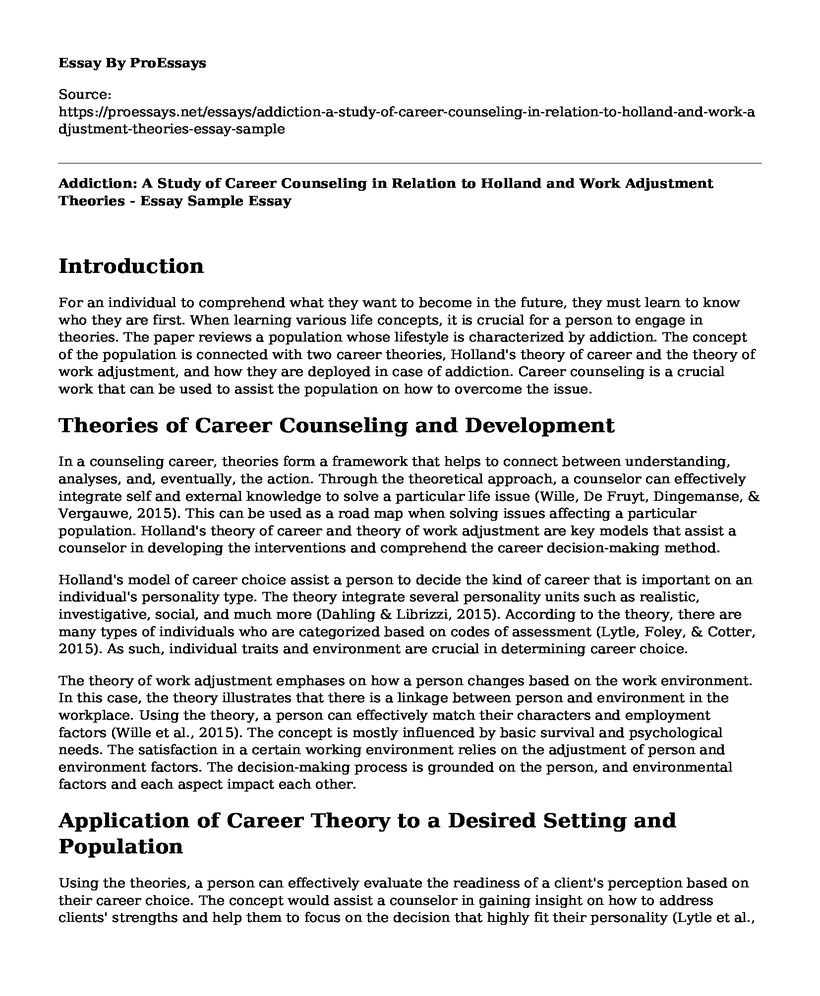Introduction
For an individual to comprehend what they want to become in the future, they must learn to know who they are first. When learning various life concepts, it is crucial for a person to engage in theories. The paper reviews a population whose lifestyle is characterized by addiction. The concept of the population is connected with two career theories, Holland's theory of career and the theory of work adjustment, and how they are deployed in case of addiction. Career counseling is a crucial work that can be used to assist the population on how to overcome the issue.
Theories of Career Counseling and Development
In a counseling career, theories form a framework that helps to connect between understanding, analyses, and, eventually, the action. Through the theoretical approach, a counselor can effectively integrate self and external knowledge to solve a particular life issue (Wille, De Fruyt, Dingemanse, & Vergauwe, 2015). This can be used as a road map when solving issues affecting a particular population. Holland's theory of career and theory of work adjustment are key models that assist a counselor in developing the interventions and comprehend the career decision-making method.
Holland's model of career choice assist a person to decide the kind of career that is important on an individual's personality type. The theory integrate several personality units such as realistic, investigative, social, and much more (Dahling & Librizzi, 2015). According to the theory, there are many types of individuals who are categorized based on codes of assessment (Lytle, Foley, & Cotter, 2015). As such, individual traits and environment are crucial in determining career choice.
The theory of work adjustment emphases on how a person changes based on the work environment. In this case, the theory illustrates that there is a linkage between person and environment in the workplace. Using the theory, a person can effectively match their characters and employment factors (Wille et al., 2015). The concept is mostly influenced by basic survival and psychological needs. The satisfaction in a certain working environment relies on the adjustment of person and environment factors. The decision-making process is grounded on the person, and environmental factors and each aspect impact each other.
Application of Career Theory to a Desired Setting and Population
Using the theories, a person can effectively evaluate the readiness of a client's perception based on their career choice. The concept would assist a counselor in gaining insight on how to address clients' strengths and help them to focus on the decision that highly fit their personality (Lytle et al., 2015). After evaluation, a counselor would help customers in finding materials they find are more interesting in their careers. This will increase their chance of clients following a certain career path based on their personality interests.
Additionally, a counselor will apply the theories to assist the client in understanding how personal interests resemble particular careers. In this case, a counselor would focus on clients' talents, which may impact the career path to take (Dahling & Librizzi, 2015). The approach needs to comprehend the learning level of customers and readiness on addiction. In case a customer is not ready, a counselor requires to handle addiction before evaluating for a career choice. The theory of Holland assists a counselor to focus on clients' interest to assist in interpreting the best career choice.
Conclusion
Theories in career counseling are essential tools that a counselor uses to assist the client in attaining their career choice. The approach forms a background way to a successful life. Holland's theories and theory of work adjustment form a depth approach, which assists a client to change various working conditions to stimulate their satisfaction. Based on the client's skills and knowledge, both models can be effective in analyzing the best career choice.
References
Dahling, J. J., & Librizzi, U. A. (2015). Integrating the theory of work adjustment and attachment theory to predict job turnover intentions. Journal of Career Development, 42(3), 215-228. Retrieved from www.academia.edu/download/40376205/DAHLING___LIBRIZZI_2015.pdf.
Lytle, M. C., Foley, P. F., & Cotter, E. W. (2015). Career and retirement theories: Relevance for older workers across cultures. Journal of career development, 42(3), 185-198. Retrieved from https://www.ncbi.nlm.nih.gov/pmc/articles/PMC4474155/.
Wille, B., De Fruyt, F., Dingemanse, S. A., & Vergauwe, J. (2015). A closer look at the psychological diversity within Holland interest types: Construct validation of the Career Insight Questionnaire. Consulting Psychology Journal: Practice and Research, 67(3), 234. Retrieved from www.allesoverassessments.nl/pdf/Wille_etal_CPJPR_2015.pdf.
Cite this page
Addiction: A Study of Career Counseling in Relation to Holland and Work Adjustment Theories - Essay Sample. (2023, Mar 16). Retrieved from https://proessays.net/essays/addiction-a-study-of-career-counseling-in-relation-to-holland-and-work-adjustment-theories-essay-sample
If you are the original author of this essay and no longer wish to have it published on the ProEssays website, please click below to request its removal:
- Values and Distinctions of Gender Inequality Essay
- Americas Housing Crisis Essay Example
- The Enron Scandal Essay Example
- Women and Power in Gilgamesh, Ramayana and the Odyssey - Essay Sample
- Essay Example on Unlock Motivation: The Life of Robert Frost, Poet & Motivator
- Essay Example on Oppression of Blacks in the USA: Theories of Accommodation
- Navigating Colorblindness: Unveiling the Complexity of Identity and Inequality - Essay Sample







